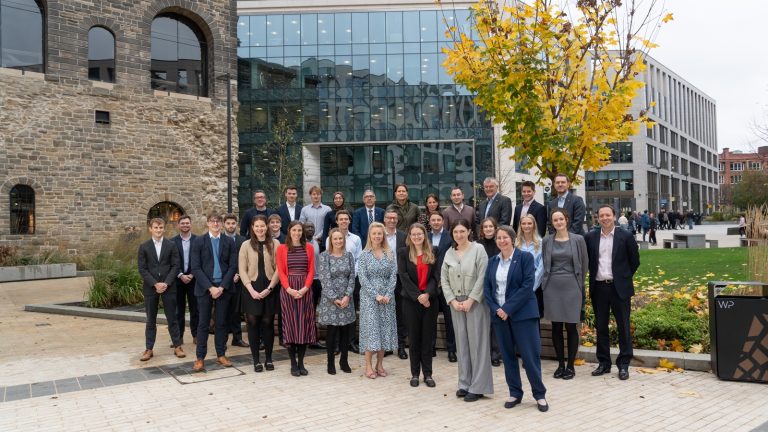Major Lincolnshire industrial unit sold for £3.3m
Watling Real Estate has completed on the sale of a substantial industrial unit in Lincolnshire for £3.3m.
Ben Holyhead and Chris Davies in the Birmingham office of Watling Real Estate were instructed by Elizabeth Welch and Matthew Ingram of Kroll, who were appointed joint administrators of Cartwright Bros (Haulage) Ltd in June this year.
A sale of the 78,733 sq ft unit on Freeman Road, North Hykeham, Lincoln was secured to a local occupier.
Ben Holyhead said: “Given the critical shortage of standing freehold industrial stock within Lincolnshire and the wider East Midlands, and with the cost of developing new accommodation exceeding £100 per sq ft, we anticipated strong interest in this unit.
“We were pleased to achieve the asking price of £3.3 million following a competitive bidding process and to conclude the sale in a timely fashion. It’s great to see this unit acquired by a local occupier, providing them with much needed space to expand their business, as well as providing valuable employment opportunities for the local economy.”
The administrators were supported by law firm Shoosmiths, with plant and machinery advice provided by Gordon Brothers.
South Yorkshire solicitors makes senior corporate appointment
Corporate M&A and venture capital specialist Tom Goff has joined Wake Smith Solicitors to lead its Corporate team, significantly expanding its legal offering to the region’s growing businesses.
Tom specialises in advising founders, entrepreneurs, investors and corporates on the full life-cycle of corporate transactions, from angel and venture capital investments though to strategic mergers, acquisitions and exits.
Former City of London-based solicitor Tom becomes Head of Corporate at Wake Smith and will lead the firm’s five-strong team, advising on all aspects of equity and debt financing, intellectual property protection, technology transactions, share incentives, re-organisations, directors’ duties and corporate governance matters.
Sheffield-born Tom, who has degrees in Artificial Intelligence and Law, said: “The Sheffield city region has a long and enviable history as a world-class centre of makers, collaborators and innovators. I am incredibly proud of the spirit and commitment the people of my home town are known for. It is fantastic to see the region building on that legacy as it continues to attract global talent and investment.
“Wake Smith has its own proud legacy of supporting the industries and people of Sheffield and South Yorkshire. As a leading law firm headquartered here in Sheffield, I am delighted to join the team and thrilled at the opportunity to help advance the next generation of growth and innovation here in our region.”
Within his twelve-year legal career at international law firms, Tom also spent nearly two years as a Senior Investment Manager at the British Business Bank, the UK’s economic development bank, also headquartered in Sheffield. He made and managed equity investments in several high tech businesses in the aerospace and defence sectors, attending board meetings of a number of portfolio companies.
Neil Salter, Chairman at Wake Smith Solicitors, said: “Tom’s hire is an important addition for Wake Smith and reinforces the Wake Smith marque. This is as an incredible opportunity to bring a new skills set into the firm at a time when Sheffield and the wider South Yorkshire and North Derbyshire regions are attracting investment, unlocking growth and achieving ambitious plans especially in manufacturing technology and processes, advanced materials and health and life-sciences.”
Tom heads up Wake Smith’s corporate and commercial team of Director and new Head of Governance, Risk and Compliance Rebecca Robinson; Associate Tom Haywood; Solicitor Joe Creasor, currently supported by trainee Solicitor Charlotte Wallage and corporate PA Debbie Huckerby, backed by the firm’s leading specialists in employment, commercial property and litigation.
Accounting and business advisory firm arrives in Leeds city centre
Chartered accounting and business advisory firm, Saffery, has completed a move into new offices at Wellington Place in Leeds city centre.
The company announced earlier this year that it had signed a lease on more than 5,000 sq ft of Grade A office space at 10 Wellington Place and recently completed a full internal fit-out to create a contemporary open plan working environment with meeting rooms and break-out areas.
Saffery employs an 84-strong team in Yorkshire, which includes eight experienced partners leading on every client. The firm had been based in Harrogate town centre since 1992 and will retain office space and meeting rooms in the spa town.
Jonathan Davis, partner and head of Saffery’s Yorkshire office, said: “For more than three decades we’ve worked hard to establish an enviable client base across nearly all sectors and throughout the whole of Yorkshire. Our clients choose to work with us because we combine robust advice and expertise, that’s local and boutique in style, with the backing of an extensive national and international support network when required.
“Our success and foundations are built on this ethos and will remain integral to our future in Leeds. Completing this move is a major milestone for our whole team and marks the start of a new era for us in Yorkshire, as well as demonstrating our longstanding commitment to our clients and our people, in a highly accessible location, close to Leeds railway station.
“Crucially, it gives us a very modern, spacious and high-quality working environment. Having a base in what has quickly become one of the city’s most prestigious office addresses, at the centre of the UK’s biggest financial and professional services market outside London, will also aid recruitment as we grow our team with several strategic appointments planned in the coming months. All this makes it a very exciting time for Saffery in Yorkshire.”
Both insolvency-related activity and levels of start-ups rise in Yorkshire and the Humber
While entrepreneurial activity across most of the UK, including Yorkshire and the Humber, continued to increase in October, so too did insolvency-related activity with only one region seeing a month-on-month fall, according to the latest research from the UK’s insolvency and restructuring trade body, R3.
Although in Yorkshire and the Humber insolvency-related activity increased by 25.6% between September and October, with 309 businesses affected (63 more than the previous month), this was the third strongest performance in the UK. Only the West Midlands saw levels fall month-on-month with a drop of 1.6%, followed by the North West with a rise of 24.4%.
Looking across the rest of the 12 nations and regions, all experienced spiralling levels of this type of activity (which includes liquidator and administrator appointments and creditors’ meetings) with Wales topping the increases with a 78.4% hike, followed by the South East (69.4%), the South West (64.5%) and East Anglia (61%).
However, the research from R3, which is based on an analysis of data provided by CreditSafe, also revealed some healthier economic indicators such as the growing numbers of start-ups.
Last month, Yorkshire and the Humber saw a 7.9% rise in new businesses, reaching 4,570 start-ups – 335 higher than in September. This was reflected across all but one of the regions and nations, with only Northern Ireland seeing a month-on-month fall of 3.7%. The strongest performers were Wales (up by 22.2%), the East Midlands (up 16.6%), the South West (up by 15.5%), the North West (up by 15.2%) and the West Midlands (up by 14.9%).
Dave Broadbent, chair of R3 in Yorkshire and partner at Begbies Traynor in York and Teesside, said: “As businesses and individuals digest the latest Budget, along with the impact of the US election, it is hoped that we can all plan for a period of calm. While the upheaval and speculation of recent months has exacerbated economic jitters in the UK, it is clear that the Government’s commitment to growth is welcome.
“As ever, it is good to see that the entrepreneurial spirit is alive and well in Yorkshire and the Humber, as well as across much of the UK. However, with many businesses having been pushed to the brink following the tumultuous events of the last few years, conditions are still extremely tough for many with fears that the latest tax burdens will add to their woes. We urge any business owners concerned about their financial position to seek advice from qualified professionals as soon as possible.”
Works start on Lincolnshire charity’s new HQ project
Works have now started on new premises for charity Naomi’s Garden following a team of construction partners coming together to offer free labour and materials at cost price.
Louth-based Naomi’s Garden provides conductive education to families who have loved ones with movement disorders, such as Cerebral Palsy, Parkinson’s, Dyspraxia and Motor Delay, as well as conditions including Autism, ADHD, sensory processing and genetic disorders and Long Covid.
Having outgrown its current centre – which limited the number of families it could support – the small team of therapists at the charity raised enough funds to secure a new building, however funds are still needed to complete the purchase and to renovate it to make it fit for purpose.
Landscape architecture practice, Influence Landscape Planning & Design, stepped in to support Naomi’s Garden by bringing together construction and professional services partners to move the project forward.
Internal works have now officially begun by Lincolnshire firm GBM Demolition, who are stripping out and widening door frames.
As previously reported, East Midlands-based construction partners who have committed to providing services are Influence, contractor G F Tomlinson, project manager and quantity surveyor Gleeds, solicitor Knights, and A + G Architects.
New to the project are commercial fit-out company APSS, glazer Tradeglaze, GRS Electrical, retailer B&Q Louth, and West Lindsey Landscapes. The charity is still hoping to find a drainage, heating, and M&E partner.
The new centre, located on Manby Park in Louth, was previously a motorcycle shop and needs extensive internal and external works to make it suitable for the charity to deliver its life changing services.
The construction partners will be working together to completely transform the building, with works including internal strip out, raising floors, installing ramps, new windows and doors, complete interior decoration, and landscaping to the exterior.
If enough money is raised, which is approximately £150,000, Naomi’s Garden’s new centre should be complete at the end of this year and welcoming families in early 2025.
When complete, the new centre will enable the charity to extend its working hours, provide group sessions and create a dynamic learning environment for all – no matter what their disability, resulting in supporting many more adults and children each year.
Managing director of Influence Landscape Planning and Design, Sara Boland, who lives in Louth, contacted Naomi’s Garden during the pandemic after having read about its plight and initially offered to help by providing landscaping services. That conversation continued to Sara offering to bring together a team of willing partners to deliver the works.
Sara said: “It’s been a real journey to get to this stage. This small charity worked incredibly hard to get to this position and through sheer grit and determination, the new centre they so desperately need is now in sight.
“A really big thank you to the companies which have supported us to date. What we are creating will positively impact so many lives and with these sort of services limited across the country, will offer more Lincolnshire and East Midlands-based families hope.
“Fundraising continues while the construction team and I focus on finding new partners and getting the work done. Any offers of help toward the project, no matter the size, are always welcome.”
Sarah-Jayne Walker, lead conductor at Naomi’s Garden, said: “As a small charity, we are overwhelmed by the kindness of local businesses who have come alongside us to help create Naomi’s Garden’s permanent home.
“Teamed with the fundraising efforts of our community we have started to see the transformation take place. We, as trustees, are beyond grateful as we continue to build on Naomi’s Legacy. Here’s to the next stages!”
Retailer B&Q at Louth recently chose the charity for its volunteering community day. At the end of October volunteers from the store spent a day creating some of the outside spaces, which included planting hedging, bulbs, hanging baskets, raised beds and clearing pathways. The retailer also donated £1,000 worth of B&Q materials which were needed for the day.
West Lindsey Landscapes were also present, preparing and digging the ground for the hedging which they kindly donated. B&Q and West Lindsey Landscapes have transformed the external areas of the new centre.
Naomi’s Garden has a SEND (Special Education Needs and Disabilities) specialist who works with the needs of children with autism, ADHD and sensory processing issues, and with the help of Lincolnshire County Council, also provides free school holiday provision services including free healthy meals and enriching activities.
To make a donation towards Naomi’s Garden’s new centre, please visit: https://www.gofundme.com/f/naomis-gardens-big-move?utm_campaign=p_nacp+share-sheet&utm_medium=copy_link&utm_source=customer
Finance For Enterprise announces double appointments
Finance For Enterprise (FFE) has appointed Adele Wells as Credit Manager and Andy Christiansen as Senior Business Lending Manager, as part of its continued growth and commitment to supporting small and medium-sized enterprises (SMEs) across the UK.
Adele Wells brings an impressive career with Yorkshire Bank to her new role as Credit Manager at FFE. During her time at Yorkshire Bank, Adele rose through the ranks, starting as a Cashier and eventually leading the Business Credit underwriting team.
Her extensive experience in credit underwriting, business lending, and leadership will be instrumental in her new role, where she will assess loan applications of up to £250,000 to help support FFE’s SME clients.
In his new role, Andy will focus on delivering essential working capital solutions to small and medium-sized enterprises (SMEs), with a particular emphasis on supporting businesses across London and the Southeast.
Andy brings with him a diverse professional background. He began his finance career in the banking sector, gaining valuable experience in understanding the financial needs of businesses. Prior to entering the world of finance, Andy worked in the travel industry, local government, and education, offering him a unique perspective on different sectors.
Commenting on her decision to join FFE, Adele said: “I was drawn to Finance For Enterprise after discovering its strong company values and ethos. Moving from a large corporation to a niche lender offers an exciting new challenge, and I’m eager to contribute my skills to support SMEs.”
Andy said: “FFE’s commitment to supporting businesses and the welcoming nature of the South Yorkshire team made joining the business an easy decision. I’m excited to play a part in helping SMEs access the capital they need to thrive.”
Andrew Austwick, Managing Director at FFE, said: “We are excited to welcome Adele and Andy to the team. Their wealth of experience and dedication will be invaluable in supporting business growth across the region and helping SMEs navigate their financial challenges.”
Harleyford Capital to upgrade Sheffield trade scheme
Harleyford Logistics Partnership, the joint venture between Tristan Capital Partners and Harleyford Capital, is to reposition part of the recently completed estate on Greenland Road in Sheffield.
As one of the premier trade parks in the region, rebranded as Sheffield Trade Park, it offers rare opportunities for more occupiers to take space.
Harleyford Capital has already commenced a programme of works to enhance roadside visibility, with landscaping improvements, larger signage zones and large illuminated totem signage alongside other on-site changes.
The highly prominent scheme enjoys substantial high profile frontage to the busy A6102 Greenland Road, with over 29,000 vehicles passing daily, and is already home to Costa Coffee, Wolseley, Formula One, Auto Windscreens and Headlam Flooring. Destination operators such as Edmundson Electrical, Kwik-Fit, Lidl, McDonalds and Shell PFS are also close by.
Four additional trade units, capable of accommodating requirements from 3,031 to 12,334 sq ft, are available on the scheme with Knight Frank and Ogle Property appointed by Harleyford to market the scheme to national and regional operators, post upgrade and rebranding.
Thomas Mallindine, on behalf of the Harleyford Logistics Partnership, said: “Sheffield is the sixth largest city in the UK and is a key target location for our investment strategy. The high quality space at Sheffield Trade Park means we have already seen strong occupier interest in the few units available.”
Harry Orwin-Allen, Associate at Knight Frank in Sheffield, added: “Sheffield Trade Park offers best in class trade accommodation based in a prime location with fantastic links to Sheffield City Centre, Meadowhall and the M1 Motorway, all within seven minutes journey time.
“The units have been designed to a high specification with trade occupiers in mind offering flexible floor plates, 8 metre eaves, ground level full height loading doors, generous dedicated car parking, excellent road frontage to Greenland Road and strong environmental credentials with remaining units having EPC A and BREEAM ‘Very Good’.”
Alfred Bartlett of Ogle Property also commented: “The scheme already possesses all the attributes sought by trade operators. The proposed works should reposition the park as one of the premier trade schemes in the region, that will appeal to both regional and national trades not already represented on the park, and to operators seeking additional representation in Sheffield.”
Leeds period building welcomes five new firms following major refurbishment
Five businesses spanning accountancy to healthcare can now call No.1 King Street in the heart of Leeds city centre their home, after the Victorian building underwent a significant refurbishment.
Strategic property and construction advisors, Fox Lloyd Jones and joint agents WSB have received high levels of interest in the contemporary workspace spanning 14,118 sq ft in total across lower ground, ground and three upper floors, situated in the professional district of Leeds on the corner of King Street and Wellington Street.
The five firms acquiring offices to take advantage of its prominent location and open plan working environment are chartered surveyors Walker Singleton, Aysgarth Chartered Accountants, engineering consultants Joseph Gallagher, sleep aid app developer Sleepiest, and law firm Ison Harrison Solicitors, who have expanded from the neighbouring building.
No.1 King Street has a rich historical legacy, with the building originally a textile warehouse before transitioning in the mid-20th century to accommodate a broader mix of businesses. The major refurbishment works recently completed include enhancing the façade, the introduction of a new main entrance and a Category A refurbishment of the office suites.
Matthew Welsh, owner of No. 1 King Steet, said: “We’re delighted to welcome five businesses of this calibre to No. 1 King Street, following the hard work and investment that has gone into completing a refurbishment on this scale.
“We feel we’ve created a vibrant working space that will immediately meet their needs, whether that’s needing to accommodate increased staff levels due to recent expansion through to accelerating growth plans in a more central location in Leeds.”
Harry Finney, associate director at Fox Lloyd Jones, said: “The number of deals transacted in such a short space of time is testament to the quality of the refurbishment.
“The building is perfectly positioned on the corner of King Street and Wellington Street with demand for high quality workspace particularly strong in this area of the city and we are delighted to have the building now 90% let. We look forward to seeing all five businesses thrive in their new working environment.”
Cosmetic Repair Company sold to property services group
Sam Moore, Managing Director of Cosmetic Repair Company (Northern) (CRC), envisages a bright future as part of integrated property services company MA Group after selling 76% of the business’s share capital.
Based in Halifax, CRC, which began trading in 2016, provides a wide range of specialist property cosmetic services including damage repairs; brick and stone tinting and cleaning; UPVC, wood and aluminium spraying; and mastic sealant services.
Operating in sectors which include housebuilding, general construction, commercial and retail buildings, and hotel and leisure, CRC will enhance the range of products and services MA Group can provide to insurers and their intermediaries, housebuilders, housing associations and build-to-rent specialists.
KBS Corporate was instructed on a sale of the company in line with Sam’s aspirational plans to push major growth, and for CRC to become a leading operator in its industry throughout the UK.
In a speedily executed transaction, led by Jacob Lord, KBS Corporate Deal Executive, a sale to MA Group was facilitated – and Sam is remaining involved in the business with strikingly positive plans to continue scaling and developing CRC.
“I’m really looking forward to joining the MA Group team and to fulfilling the growth plans for CRC,” said Sam. “The company will now have the infrastructure to execute services for our clients at a higher level with the assistance and help of a wider group.
“These are very encouraging times for CRC and I’m excited about what the future will bring as part of the MA Group. I’d like to thank everyone who has helped with the transition and we are all looking forward to building on the success so far.”
MA Group, based in Aylesbury, has been trading since 1996 and is among the UK’s market leaders in its field, managing over 200 suppliers (building contractors, surveyors, specialist contractors and disaster restoration branches) nationwide, project-managing tens of thousands of claims each year.
Paul Hayman, CEO of MA Group, said: “I’m delighted that we have completed this acquisition, bringing more scale, technical expertise and excellence to MA Group.
“Our continued expansion into surface repairs complements our existing services and will bring more benefits to our clients and their customers.
“We are excited to build a nationwide surface-repair solution in a fragmented industry. We look forward to bringing the same market-leading changes to the surface repair industry that we have brought to the restoration industry.”
Jacob Lord praised the work of his KBS Corporate colleagues Carmen Wong (Document Writer) and Julia Gorska (Research Analyst) for helping to enable the transaction to be completed within six weeks of the initial Heads of Terms being signed.
“The marketing documents were well prepared by Carmen and the buyer introduced by Julia,” explained Jacob. “MA Group were among the first buyers introduced as a result of Julia’s research efforts. We were quickly into negotiations following positive meetings.
“MA Group were very impressed by what Sam had built. Sam’s ongoing role in the business was of vital interest as they recognised his talent and drive early in the discussions.
“Sam has been a pleasure to deal with from start to finish – a very motivated and driven individual, which was ideal in this collaborative process. The buyers were also very professional, moved quickly, had the right people involved and focused on the aspects of the deal that mattered.”
Jacob also expressed thanks to Richard Coulthard of the Ison Harrison law firm for the “exceptional job” he did in maintaining Sam’s best interests throughout the transaction.
Leeds co-living scheme given the green light
Leeds City Council has approved Watkin Jones’ plans for the conversion and re-purposing of Headrow House at 42 The Headrow, into 230 co-living homes.
Headrow House is a vacant office block in the centre of Leeds. When completed in 2028, the project will deliver a supported communal living environment, offering managed homes for city centre living and will help to address the demand for rental accommodation that continues to outstrip supply in Leeds.
The project is a prime opportunity to restore and repurpose an historic building and contribute to the regeneration of vacant buildings in the city centre. The scheme will retain retail units on the ground floor, helping to support local residents and businesses and Headrow House will only be a short walk from popular restaurants and shopping centres.
The co-living design supports the Group’s ESG strategy, emphasising reuse and energy efficiency, and attaining BREEAM ‘Excellent’ certification. The retrofit enhances thermal efficiency and air permeability, with electric heating for net zero carbon, energy-efficient windows, and air source heat pumps.
Photovoltaic panels, efficient lighting, and energy-saving controls will optimise performance. By reusing the building, the scheme will reduce embodied carbon by 78% and Watkin Jones will use sustainable landscaping throughout.
Importantly, the design will serve evolving residents’ needs and will include many social benefits. Headrow House will offer its occupiers a gym, shared kitchens and dining areas, a cinema, co-working lounge, library, laundry room and bicycle parking in addition to personal storage rooms.
Iain Smith, Planning Director at Watkin Jones, said: “We are very excited to announce planning approval for Headrow House, our first co-living project in Leeds. Ranked the third largest city by population in the UK, Leeds is a vital commercial and residential centre, and we are committed to providing high-quality, sustainable co-living accommodation that will help to address the on-going demand for rental homes in Leeds city centre.
“We look forward to continuing our collaborative efforts with Leeds City Council and our local communities to address this growing demand, while also supporting our ESG targets as a business.”












